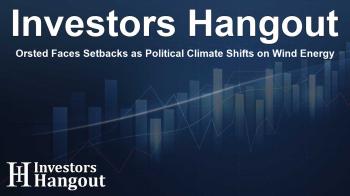Orsted Faces Setbacks as Political Climate Shifts on Wind Energy

Orsted's Recent Market Activity
Recently, shares in Orsted, the renowned sustainable energy company, experienced a decline amidst political turbulence concerning wind energy in the United States. Following statements from President-elect Donald Trump regarding the future of wind farms, investor sentiment in the renewable sector appeared to dampen significantly. The comments made during a press conference set off alarm bells for investors keen on the future developments of wind energy projects.
The Impact of Trump's Energy Policy
During the press conference, Trump clarified his intentions to halt the construction of new wind farms should he return to office. He asserted that no windmills would be built under his administration, compelling market analysts to reevaluate their perspectives on the renewable energy landscape. Trump's criticism of the current administration's policies, particularly those that emphasize clean energy, further complicated the situation.
Criticism of Renewable Energy Initiatives
The former president expressed skepticism concerning the viability of wind energy, claiming it to be less cost-effective compared to natural gas. Additionally, Trump referenced his previous opposition to a proposed wind farm near his golf course in Scotland, showcasing his long-standing reservations about wind development.
Potential Effects on Offshore Wind Projects
An important focal point of Trump's comments was a proposed offshore wind project off the New Jersey coast, which includes plans for an extensive setup of wind turbines. Analysts noted that this initiative, along with others, is now seemingly at risk due to the incoming administration's stance on energy regulation.
Market Repercussions for Orsted and Peers
The response from the market was immediate. Analysts at RBC Capital Markets highlighted that Trump's rhetoric might enhance risks for the wind industry as a whole. This encompasses both onshore and offshore projects across the US, emphasizing a growing sentiment against offshore wind initiatives fueled by the anticipated shift in administration.
Impacts on Competitors and Related Sectors
Shares of other companies operating in similar sectors, such as Vestas Wind Systems and Siemens Energy, also exhibited declines, illustrating a collective apprehension regarding the future of the industry. As the political landscape shifts, many are left questioning the stability and growth potential of wind energy within the US economy.
Concerns Over Rising Energy Costs
The criticism directed at Trump's energy policies raises significant concerns regarding the potential repercussions on electricity prices for consumers. Critics argue that a retreat from wind power could ultimately lead to increased energy costs and limit available power sources. Wind energy, widely regarded as one of the most cost-effective options for electricity generation, is crucial for the energy portfolio of the US.
The Future of Renewable Energy
Investment firms like Lazard have indicated that while some renewable technologies continue to compete effectively against traditional power sources, the overarching regulatory framework plays a critical role in shaping market dynamics. The future competitiveness of renewable energy will heavily rely on supportive policies to foster growth and innovation in this essential sector.
Embracing Change Amidst Challenges
As Orsted and its competitors navigate through these political and market challenges, the emphasis will be on adaptability and resilience. Staying informed about evolving policies and fostering public support for sustainable solutions might prove pivotal for the future of wind energy amidst uncertainties. The landscape may be shifting, but the commitment to renewable energy remains a strong focus for industry leaders.
Frequently Asked Questions
What led to Orsted's share decline?
Orsted's shares dropped due to President-elect Trump's announcement to halt new wind farm constructions, stirring concerns in the renewable energy sector.
How does Trump's policy affect wind energy?
Trump's policy aims to limit wind farms, which could lead to increased risks for existing and future offshore and onshore wind projects.
What are the implications of renewable energy policies?
The shift in policies could drive electricity costs up and reduce available power sources, impacting consumers and the broader economy.
How are competitors responding to these changes?
Other companies in the renewable sector, such as Vestas and Siemens, also experienced share declines, mirroring concerns about a less supportive political environment.
Can renewable technologies remain competitive?
Investment reports suggest that certain renewable technologies can still compete favorably with conventional energy sources, but reliance on favorable policies is essential.
About The Author
Contact Henry Turner privately here. Or send an email with ATTN: Henry Turner as the subject to contact@investorshangout.com.
About Investors Hangout
Investors Hangout is a leading online stock forum for financial discussion and learning, offering a wide range of free tools and resources. It draws in traders of all levels, who exchange market knowledge, investigate trading tactics, and keep an eye on industry developments in real time. Featuring financial articles, stock message boards, quotes, charts, company profiles, and live news updates. Through cooperative learning and a wealth of informational resources, it helps users from novices creating their first portfolios to experts honing their techniques. Join Investors Hangout today: https://investorshangout.com/
The content of this article is based on factual, publicly available information and does not represent legal, financial, or investment advice. Investors Hangout does not offer financial advice, and the author is not a licensed financial advisor. Consult a qualified advisor before making any financial or investment decisions based on this article. This article should not be considered advice to purchase, sell, or hold any securities or other investments. If any of the material provided here is inaccurate, please contact us for corrections.

